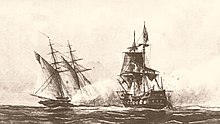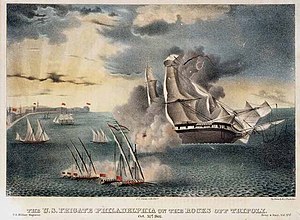First_Barbary_War
I wonder if either of you knew that Jefferson was our first war monger president, other than Washington of course.
In March 1785, Thomas Jefferson and John Adams went to London to negotiate with Tripoli's envoy, Ambassador Sidi Haji Abdrahaman (or Sidi Haji Abdul Rahman Adja). Upon inquiring "concerning the ground of the pretensions to make war upon nations who had done them no injury", the ambassador replied:
It was written in their Qu'ran, that all nations which had not acknowledged the Prophet were sinners, whom it was the right and duty of the faithful to plunder and enslave; and that every Muslim who was slain in this warfare was sure to go to paradise. He said, also, that the man who was the first to board a vessel had one slave over and above his share, and that when they sprang to the deck of an enemy's ship, every sailor held a dagger in each hand and a third in his mouth; which usually struck such terror into the foe that they cried out for quarter at once. [12]
Jefferson reported the conversation to Secretary of Foreign Affairs John Jay, who submitted the Ambassador's comments and offer to Congress. Jefferson argued that paying tribute would encourage more attacks. Although John Adams agreed with Jefferson, he believed that circumstances forced the U.S. to pay tribute until an adequate navy could be built. The U.S. had just fought an exhausting war, which put the nation deep in debt. Federalist and Anti-Federalist forces argued over the needs of the country and the burden of taxation. Jefferson's own Democratic-Republicans and anti-navalists believed that the future of the country lay in westward expansion, with Atlantic trade threatening to siphon money and energy away from the new nation on useless wars in the Old World.[13] The U.S. paid Algiers the ransom, and continued to pay up to $1 million per year over the next 15 years for the safe passage of American ships or the return of American hostages. Payments in ransom and tribute to the privateering states amounted to 20% of the U.S. government's annual revenues in 1800.[citation needed]
Jefferson continued to argue for cessation of the tribute, with rising support from George Washington and others. With the recommissioning of the American navy in 1794 and the resulting increased firepower on the seas, it became increasingly possible for America to refuse paying tribute, although by now the long-standing habit was hard to overturn.
[edit]
"Immediately prior to Jefferson's inauguration in 1801, Congress passed naval legislation that, among other things, provided for six frigates that 'shall be officered and manned as the President of the United States may direct.' . . . In the event of a declaration of war on the United States by the Barbary powers, these ships were to 'protect our commerce & chastise their insolence — by sinking, burning or destroying their ships & Vessels wherever you shall find them.'"[14] On Jefferson's inauguration as president in 1801, Yusuf Karamanli, the Pasha (or Bashaw) of Tripoli, demanded $225,000 from the new administration. (In 1800, Federal revenues totaled a little over $10 million.) Putting his long-held beliefs into practice, Jefferson refused the demand. Consequently, in May 1801, the Pasha declared war on the U.S., not through any formal written documents but in the customary Barbary manner of cutting down the flagstaff in front of the U.S. Consulate. Algiers and Tunis did not follow their ally in Tripoli.
In response, "Jefferson sent a small force to the area to protect American ships and citizens against potential aggression, but insisted that he was 'unauthorized by the Constitution, without the sanction of Congress, to go beyond the line of defense.'"[14] He told Congress: "I communicate [to you] all material information on this subject, that in the exercise of this important function confided by the Constitution to the Legislature exclusively their judgment may form itself on a knowledge and consideration of every circumstance of weight.'"[14] Although Congress never voted on a formal declaration of war, they did authorize the President to instruct the commanders of armed American vessels to seize all vessels and goods of the Pasha of Tripoli "and also to cause to be done all such other acts of precaution or hostility as the state of war will justify."
The schooner USS Enterprise defeated the 14-gun Tripolitan corsair Tripoli after a fierce but one-sided battleon August 1, 1801.
In 1802, in response to Jefferson's request for authority to deal with the pirates, Congress passed "An act for the Protection of Commerce and seamen of the United States against the Tripolitan cruisers", authorizing the President to "... employ such of the armed vessels of the United States as may be judged requisite ... for protecting effectually the commerce and seamen thereof on the Atlantic ocean, the Mediterranean and adjoining seas."[15] "The statute authorized American ships to seize vessels belonging to the Bey of Tripoli, with the captured property distributed to those who brought the vessels into port."[14]
The U.S Navy went unchallenged on the sea, but still the question remained undecided. Jefferson pressed the issue the following year, with an increase in military force and deployment of many of the Navy's best ships to the region throughout 1802. TheUSS Argus, Chesapeake, Constellation, Constitution, Enterprise, Intrepid, Philadelphia and Syren all saw service during the war under the overall command of Commodore Edward Preble. Throughout 1803, Preble set up and maintained a blockade of the Barbary ports and executed a campaign of raids and attacks against the cities' fleets.
[edit]Battles
In October 1803, Tripoli's fleet was able to capture USS Philadelphia intact after the frigate ran aground while patrolling Tripoli harbor. Efforts by the Americans to float the ship while under fire from shore batteries and Tripolitan naval units failed. The ship, its captain, William Bainbridge, and all officers and crew were taken ashore and held as hostages. Philadelphia was turned against the Americans and anchored in the harbor as a gun battery.
On the night of February 16, 1804, Lieutenant Stephen Decatur led a small contingent of the U.S.'s first Marines in the captured Tripolitan ketch rechristened USS Intrepid, to deceive the guards on board Philadelphia and float close enough to board the captured ship. Decatur's men stormed the vessel and overpowered the Tripolitan sailors standing guard. With support from American ships, the Marines set fire to Philadelphia, denying her use to the enemy. The bravery in action of Lieutenant Stephen Decatur made him one of the first American military heroes since the Revolutionary War. The British Admiral Horatio Nelson, himself known as a man of action and bravery, is said to have called this "the most bold and daring act of the age.[16]"
Preble attacked Tripoli outright on July 14, 1804, in a series of inconclusive battles, including a courageous but unsuccessful attack by the fire ship USSIntrepid under Captain Richard Somers. Intrepid, packed with explosives, was to enter Tripoli harbor and destroy itself and the enemy fleet; it was destroyed, perhaps by enemy guns, before achieving that goal, killing Somers and his crew.[citation needed]
The turning point in the war came with the Battle of Derna (April–May 1805). Ex-consul William Eaton, who went by the rank of general, and US MarineFirst Lieutenant Presley O'Bannon led a mixed force of eight United States Marines[17] and 500 Greek, Arab, and Berber mercenaries on a march across the desert from Alexandria, Egypt to assault and to capture the Tripolitan city of Derna. This was the first time in history that the United States flag was raised in victory on foreign soil. This action was memorialized in a line from the Marines' Hymn—"the shores of Tripoli." [18]
[edit]Peace treaty and legacy
Wearied of the blockade and raids, and now under threat of a continued advance on Tripoli proper and a scheme to restore his deposed older brother Hamet Karamanli as ruler, Yussif Karamanli signed a treaty ending hostilities on June 4, 1805. Article 2 of the Treaty reads:
The Bashaw of Tripoli shall deliver up to the American Squadron now off Tripoli, all the Americans in his possession; and all the Subjects of the Bashaw of Tripoli now in the power of the United States of America shall be delivered up to him; and as the number of Americans in possession of the Bashaw of Tripoli amounts to Three Hundred Persons, more or less; and the number of Tripolino Subjects in the power of the Americans to about, One Hundred more or less; The Bashaw of Tripoli shall receive from the United States of America, the sum of Sixty Thousand Dollars, as a payment for the difference between the Prisoners herein mentioned.
In agreeing to pay a ransom of $60,000 for the American prisoners, the Jefferson administration drew a distinction between paying tribute and payingransom. At the time, some argued that buying sailors out of slavery was a fair exchange to end the war. William Eaton, however, remained bitter for the rest of his life about the treaty, feeling that his efforts had been squandered by the State Department diplomat Tobias Lear. Eaton and others felt that the capture of Derne should have been used as a bargaining chip to obtain the release of all American prisoners without having to pay ransom. Furthermore, Eaton believed the honor of the United States had been compromised when it abandoned Hamet Karamanli after promising to restore him as leader of Tripoli. Eaton's complaints generally fell on deaf ears, especially as attention turned to the strained international relations which would ultimately lead to the War of 1812.[citation needed]
The First Barbary War was beneficial to the military reputation of the U.S. America's military command and war mechanism had been up to that time relatively untested. The First Barbary War showed that America could execute a war far from home, and that American forces had the cohesion to fight together as Americans rather than separately as Georgians or New Yorkers. The United States Navy and Marines became a permanent part of the American government and American history, and Decatur returned to the U.S. as its first post-Revolutionary war hero.[citation needed]
However, the more immediate problem of Muslim Barbary piracy was not fully settled. By 1807, Algiers had gone back to taking American ships and seamen hostage. Distracted by the preludes to the War of 1812, the U.S. was unable to respond to the provocation until 1815, with the Second Barbary War, in which naval victories by Commodores William Bainbridge and Stephen Decatur led to treaties ending all tribute payments by the U.S.[19]




0 Comments:
Post a Comment
<< Home